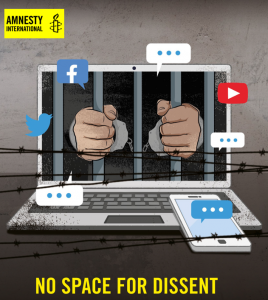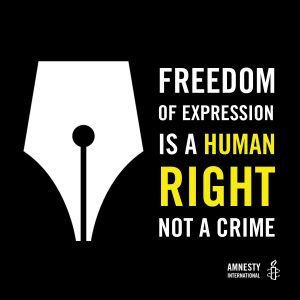Particularly in times of crisis, reliable and verified information is urgently needed – and is itself in need of safeguarding. World Press Freedom Day 2022 highlights the evolution and acceleration of challenges to media freedom, independence, pluralism, and safety of journalists in a digital world. How do these relate to libraries’ own experiences as information professionals – and what lessons can we learn from these, to work together towards a stronger and freer media landscape?
A call to action in a time of need
The theme of this year’s World Press Freedom Day is journalism under digital siege. The aim is to draw attention to the evolution, and acceleration, of challenges to journalism in today’s digital and hyperconnected information environment: the viability of digital business models; surveillance (both large-scale and targeted); data collection; access to information; and the need for more transparency.
An accompanying message by the Director-General of UNESCO also reflects on the approaching 1-year anniversary of the Windhoek+30 Declaration, which further elaborates on the role of information as a public good. Online platform transparency principles, an emphasis on media and information literacy, research into new sustainable business models are among the activities UNESCO has been spearheading to help deliver on the Declaration’s ambitions.
Vitally, the note closes with a call for all stakeholders – from Member States to civil society to technology companies and beyond – to play their part in building a new journalism and media configuration, one that simultaneously tackles the risks and seizes the opportunities of digital.
This call, of course, comes at a crucial time. The latest UNESCO World Trends in Freedom of Expression and Media Development report highlights that, over the past five years, around 85% of the world’s population saw a decline in press freedom in places where they live. In the 2022 World Press Freedom Index, Reporters Without Borders also noted a marked two-fold polarisation – within and between countries – as an effect of a chaotic and globalised information space.
Echoing experiences in journalism and librarianship: lessons learned and moving forward
To chart the path towards a revitalised and fairer media landscape, it’s worth looking at some of the key trends and lessons learned set out in the latest flagship report, and see how they are echoed in different media in information sectors – including, of course, the library field.
Threats to freedom of expression and the safety of journalists: this remains a top priority. Violence, crimes and threats against journalists are a most egregious example – and, as the report points out, awareness of threats to their digital safety and (online) hostility, including gender-based violence, is growing in recent years. Such violence can stifle or silence voices, reducing the variety of ideas and works available to library users, impoverishing the information environment.
In addition to the ‘private’ censorship enforced by individuals or groups, a related key element lies in the broader policy environment. The report notes that more than 50 laws and regulations introduced around the world since 2016 contain vague language or heavy penalties which impact freedom of expression and of media online. These regulations can range from targeting cybercrime to ‘rumors’ or ‘fake news’.
In the library field, a parallel could be pointed out to a chilling impact of a threat of possible legal action for reading material or curation choices. It is a threat which, as the New York times reported, even if entirely lacking a basis for a criminal investigation, can have a chilling effect and encourage self-censorship.
Financial viability continues to be a pressing concern in the news media field, only growing in urgency. The ways this plays out in commercial media – e.g. advertisement or subscription-based revenue models – are well-documented of course.
However, it is not aways the case that alternative funding sources are necessarily better. Indeed, the report offers valuable insights into the viability considerations around two other models of journalism – public broadcasting and community-based media.
For public service media, vulnerability in the face of political pressure (including through their financing) remains an important concern. In some parts of the world, public broadcasting enjoys relatively high trust among audiences, but it may in some cases struggle to reach more diverse demographics.
The situation for community media viability also seems to be mixed; as increasing polarisation can raise concerns around licensing and financial fragility, as well as a possibility of capture by private, economic or religious interests.
In light of these financial concerns, many journalists feel less secure in their jobs today, as employment figures in this field see a substantial decline. There are similar concerns in the library field in some parts of the world, of course, especially in light of austerity measures – also prompting a discussion about the possible impacts on access to trustworthy information and the health of a democratic public dialogue without the support that librarians can provide for it.
Finally, it is of course worth revisiting the discussion on trustworthy information as a public good. On the supply side, the report makes a note of both algorithmic curation and the saturation of the information field with a multitude of competing content producers.
On the demand side, there are nonetheless factors which can limit the public’s access to vital journalism, news media, and information at large – from internet shutdowns and takedown requests to the costs of digital subscriptions, internet connectivity and access devices, which can be prohibitive for some users. This continues to raise concerns about unequal access to information, and a cause for action.
At the same time, some data – e.g. the Edelman Trust Barometer and the Reuters Institute Digital News Report – suggests that trust in different sources of information, while varying per source (e.g. with traditional media enjoying more user confidence than social media), is overall quite fragile, and sees a long-term negative trend over the past few years.
All these are familiar concerns and consideration for libraries, of course. Whether it is providing no-cost access to computers and the internet, championing media literacy, or speaking out against opaque search algorithms and curation practices of third-party providers – boosting both supply and demand for information as a public good lies at the heart of the profession.
Together for access to information and freedom of expression
Naturally, it is important to also mark and celebrate progress where we see it. The report notes, for example, that in less than 20 years the number of countries with access to information (ATI) laws has tripled. This progress can be attributed to both public sector commitments and civil society initiatives, showing what can be achieved with dedicated efforts and collaboration.
As we mark this year’s Press Freedom Day, librarians of course feel a lot of empathy towards our journalist colleagues working to make vital and high-quality information available to all. Here, librarians are both allies who can help raise awareness about the value of free press and the challenges it faces – and a synergetic partner whose core function is to make information and knowledge accessible to all.
At the same time, we see more conversations about the possible ways to democratise and reinvent the way news media is produced and distributed – especially at the local level. Some of these discussions focus on innovative business models, others – on ways to build an inclusive ecosystem and a thriving civic journalistic infrastructure.
These discussion reference libraries – as information hubs (especially for the most vulnerable community members), verifiers of community information, and one of the community infrastructures offering an alternative to the commercial media system. We look forward to seeing these exploratory dialogues continue, and to work together to realise the promise of information as a public good!
 Each year in late summer I take time to review the cases that Amnesty International has chosen to call attention to during the widely observed
Each year in late summer I take time to review the cases that Amnesty International has chosen to call attention to during the widely observed 